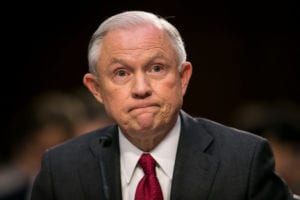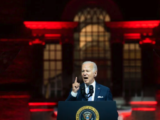The Big Picture –
By Glynn Wilson –
WASHINGTON, D.C. — What happens when you have a United States Attorney General who is just as much of a liar as the president, only one who has been in Washington much longer and understands the practice of dissembling in answering questions and claiming a faulty memory?
You put on a dog and pony show before the U.S. Select Committee on Intelligence and allow President Donald J. Trump’s pick for attorney general, Jeff Sessions of Mobile, Alabama, to refuse to answer questions, claim he can’t remember meetings with Russian officials during the campaign or after the election, and mislead his way into keeping his job.
The straight mainstream media organizations have no choice but to report on the hearing as well as they can on deadline.
Reuters, for example, ran a story saying U.S. attorney general dodges Trump questions, angering Democrats.
They reported that Sessions “denounced as a ‘detestable lie’ the idea he colluded with Russians meddling in the 2016 election,†and that he “clashed with Democratic lawmakers over his refusal to detail his conversations with President Donald Trump.â€
“You raised your right hand here today and said you would solemnly swear to tell the truth, the whole truth and nothing but the truth,” Democratic Senator Martin Heinrich said. “Now you’re not answering questions. You’re impeding this investigation.”
Sessions refused to say whether he and Trump discussed FBI Director James Comey’s handling of an investigation into possible collusion between Trump’s campaign and Russia during the election campaign before the president fired Comey on May 9. He also declined to say if Trump opposed Sessions’ decision to recuse himself from the Russia probe in March (even though we know he did based on Trump’s Twitter tweets, interviews and previous coverage). And he refused to say whether Justice Department officials discussed with the president possible pardons of individuals being investigated in the Russia probe.
“I believe the American people have had it with stonewalling,†Democratic Senator Ron Wyden told Sessions. “Americans don’t want to hear that answers to relevant questions are privileged.”
“I am not stonewalling,” Sessions replied, saying he was simply following Justice Department policy not to discuss confidential communications with the president, even though president Trump has not invoked executive privilege and has even offered to testify under oath himself. He has even hinted he may have tapes of his conversations with Comey and may release them soon.
But due to the seeming lack of any noteworthy bombshells from Sessions testimony, news organizations were left with little choice but to report that Sessions’ testimony “did not provide any damaging new information on Trump campaign ties with Russia or on Comey’s dismissal.†Yet “his refusal to discuss conversations with Trump raised fresh questions about whether the White House has something to hide,†according to Reuters.
The Washington Post reported that Sessions refused to say whether he spoke to Trump about Comey’s handling of the Russia investigation.
The New York Times editorial board asked in Wednesday’s paper: How many ways are there to fail to answer a question under oath?
“The last time Mr. Sessions appeared before a Senate committee, during his confirmation hearing in January, he gave false testimony,†the Times says.
“I did not have communications with the Russians,†Mr. Sessions said in response to a question no one asked — and despite the fact that he had, in fact, met with the Russian ambassador, Sergey Kislyak, at least twice during the 2016 presidential campaign.
“The omission raised questions not only about his honesty, but also about why he would not disclose those meetings in the first place,†the paper says. Sessions “arrived in full body armor, testy and sometimes raising his voice to defend what he called his honor against ‘scurrilous and false allegations’ that he had colluded with Moscow.â€
Sessions also defended his misstatements in January, to the Judiciary Committee, as being taken out of context, and he lowered a broad cone of silence around all his communications with President Trump regarding last month’s firing of James Comey as FBI director, claiming it was “inappropriate†for him to discuss them. Did they involve classified information? No. Was he invoking executive privilege? No, he said, only the president may invoke that. Reminded that Mr. Trump has not done so, he said, “I’m protecting the right of the president to assert it if he chooses†at some future point.
But wait. If you listened closely, and obtained the transcript of the testimony, as I did, there is one statement that stands out that in fact could be damning for Sessions and Trump.
Under grilling from attorney Kamala Harris, the junior Senator from California, most of which got lost when Sessions dissembled and the chair of the committee upbraided Harris and demanded that she let Sessions answer the question, there was this exchange which most people probably missed, including the reporters whose job it is to report on these things.
HARRIS: Are you aware of any communications with any Trump officials or did you have any communications with any officials about Russia or Russian interests in the United States before January 20?
SESSIONS: No. I may have had some conversations, and I think I did, with the general strategic concept of the possibility of whether or not Russia and the United States could get on a more harmonious relationship and move off the hostility.
Stop. Wait. Think.
The allegation against Trump and his surrogates all along has been that they were communicating with Russian officials to perhaps promise Russia a better deal than they were getting under President Barack Obama, who had slapped sanctions on Russia and even more after the U.S. intelligence agencies reported before Obama left office that Russia had tried to interfere in the U.S. election with spying, hacking and putting out “fake news.â€
Trump himself has called former KGB chief and now Russian President Vladimir Putin “a good guy†and indicated he wanted to have a better relationship with Russia. It’s possible that this could have to do with the fact that Trump was able to borrow money from Russian mobsters and oligarchs after his Atlantic City casinos went into bankruptcy and he could no longer get loans from U.S. banks. His son-in-law, Jarred Kushner, has openly admitted this was the case. This story has already been widely reported, even by Fox News.
So under questioning, Sessions says “no,†to misdirect. Then he basically says yes. “I may have had some conversations, and I think I did (with Russian officials), with the general strategic concept of the possibility of whether or not Russia and the United States could get on a more harmonious relationship…â€
So while lying to the committee by saying no, Sessions admits that he did have meetings and he did talk about exactly what Trump wanted to talk about, better relations with Russia — for their financial help and perhaps for helping Trump win the election by smearing Hillary Clinton.
Trump clearly wanted to repay Russia for helping him in his time of need, and maybe even for helping him win the election, and Sessions just admitted as much, under oath, although it came near the end of the hearing when people were distracted by everything else that was being said, drowning out what Sessions actually said.
I believe it was President Ronald Reagan who perfected this style of testimony when he was questioned about his role in the Iran-Contra scandal back in the late 1980s.
“Yes, no, I really can’t recall.â€
This is come to be known as a non-denial denial, and Sessions is guilty of it here — under oath. It’s kind of hard to charge someone with obstruction of justice when they say “no” and “yes” and “I don’t remember.”
Will anything come of it? Good question. I hope to get a chance to ask Sessions about this soon in person myself and capture it on video. If Congress can’t get to the bottom of this, maybe I can.














